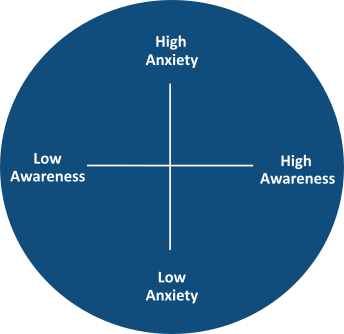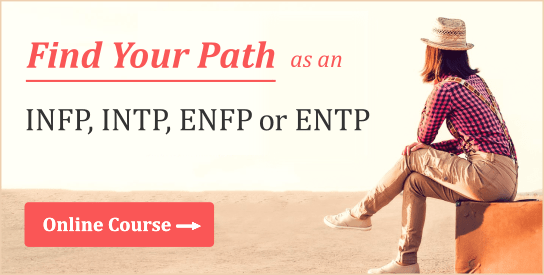
We typically think of introverts as being more naturally anxious than extraverts. And there are studies supporting this notion. In my book, My True Type, I discuss Jerome Kagan’s research on temperamental differences among infants and children. Kagan found that some infants, which he referred to as “high reactives,” were inherently more sensitive and anxious in their responses to external stimuli. He also found that high reactives tended to exhibit more introverted characteristics over the course of their lives. Similarly, Elaine Aron, best known for her work on “highly sensitive persons” (HSPs), has suggested that approximately 70% of sensitive persons are introverted.
Despite this ostensible relationship between introversion and anxiety, there are plenty of anxious extraverts as well. We also know that anxiety levels can vary broadly among individuals of the same personality type.
In addition, not everyone perceives and responds to anxiety in the same way. Some find it paralyzing and debilitating. Others find it stimulating, perhaps seeing it as an energy booster or an invocation to creativity, as might be said of “facilitative anxiety.” In his work on flow states, for instance, Mihály Csíkszentmihályi has found that our preferred level of arousal is situated between boredom (i.e., hypo-arousal) and high anxiety (i.e., hyper-arousal).
Nor can we assume that anxious individuals are always aware of their anxiety. Being anxious is one thing, being aware of it is another. And awareness matters, as it can modulate anxiety in positive or negative ways. We might therefore conceive of anxiety in terms of two axes, one marking general levels of anxiety and the other indicating levels of anxiety awareness:

In this post, we will examine anxiety and self-awareness (including anxiety awareness) through the lens of personality, paying special attention to introvert-extravert differences. We will then consider the pros and cons of increased awareness with respect to managing anxiety.
Anxiety & Self-Awareness in Extraverts
One of the most anxious people I know is an ENTP. A veritable tornado of uncertainty and chaos (I’ve known ENFPs with a similar presentation), he is most certainly a case of undiagnosed “anxious attention-deficit disorder” (ADD Type 7). What I find most interesting, however, is despite his chronic anxiousness, he doesn’t really think of himself as an anxious person. Happy and sunny most of the time, he’s largely oblivious to and unfazed by his anxiety. To my knowledge, he’s never sought medical treatment, although he does self-medicate through regular alcohol consumption. Despite the fact that others not infrequently admonish him to focus and be a better listener, it never seems to stick.
While my ENTP friend is admittedly an extreme example, he nonetheless illustrates how some extraverts experience and deal with anxiety. Namely, they may be relatively unaware of their anxiety, even when patently obvious to others. Even in cases where their functioning is somehow impaired, they may be inclined to downplay or ignore it. My ENTP friend rarely worries about himself per se. Rather, his worries are almost always centered on external matters. This comports with Jung’s view of the extravert—one whose attention is habitually directed outwardly. This outer focus makes it easy and natural for extraverts to overlook what’s happening within themselves.
So what are the dangers of ignoring or downplaying anxiety? Burnout is a big one. Extraverts may end up running themselves ragged—working and playing hard, not getting enough sleep, mistreating their bodies, etc.—without thinking twice about it. Thus, in order to slow an extravert down, the mind / body may be forced to resort to some form of physical pain or illness, which even the most extreme extraverts cannot ignore. Unfortunately, extraverts can be slow to make the connection between their lifestyle and their bodily symptoms. Intuitive (N) extraverts, in particular, can be quite disconnected from their physicality, perhaps feeling like their body “has a mind of its own.”
That said, we know that some extraverts are more self-aware than others, including being better attuned to their anxiety and its precursors. This gives them a leg up when it comes to effectively understanding and managing it.
Anxiety & Self-Awareness in Introverts
If extraverts are inclined to downplay their anxiety, introverts may go in the other direction. Not only do introverts seem more disposed to anxiety, but because they focus their attention inwardly, they can be sensitive to even slight shifts in their anxiety levels. An introvert who takes down an extra cup of coffee with friends, for instance, may immediately start feeling more anxious and jittery. By contrast, most extraverts would be far less sensitive to, let alone take the time to worry about, the effects of such a seemingly innocuous act.
Granted, we can’t and shouldn’t assume that all introverts are highly attuned their anxiety. Although introverts may have a greater capacity for self-awareness by virtue of using a dominant introverted function, this is no guarantee of self-awareness, especially early in life. I personally had a relatively poor sense of how anxious and high-strung I was until I started practicing yoga and meditation in my late twenties. The more awareness I developed, the more I realized and was surprised by how much tension I was carrying. I suspect that introverts who are perpetually busy or achievement-oriented are good at finding ways, not unlike extraverts, of suppressing, overriding, or harnessing their anxiety to get things done.
Anxiety may also manifest differently among introverted (I) judging (J) types (i.e., “IJs”) versus introverted (I) perceiving types (i.e., “IPs”). Since IJs, as external judgers, typically give the impression that they have everything under control, their anxiety is more likely to go undetected by others. In many respects, IJs are adept at bottling anxiety. Some may even manage to conceal it from themselves.
IPs, by contrast, tend to be more open and casual in their outer presentation. INPs, in particular, may seem more palpably anxious, as the “all over the place” nature of Extraverted Intuition (Ne) can evoke a sense of nervous energy. IPs can also be inwardly high strung, in part because they lead with an introverted judging function (Fi or Ti).
At any rate, introverts with higher levels of self-awareness have an advantage with respect to identifying potential contributors to their anxiety. For instance, if an introvert discovers that two cups of coffee is enough to significantly escalate her anxiety, which would not be uncommon considering introverts’ sensitivity to caffeine, then scaling back to one cup will surely prove helpful.
That said, there are times when self-awareness or self-consciousness can exacerbate anxiety. Consider this scenario. Two people prone to anxiety are going for a job interview. One is acutely aware that her anxiety can spike in these sorts of situations, while the other is either unconcerned or oblivious in this respect. Who will perform better? It’s hard to say without more information. If the first candidate added effective coping strategies to her self-awareness, she would probably perform better in the interview. However, if she was merely aware of her anxiety without knowing how to manage it, she may actually perform worse than the less self-aware candidate.
Is Awareness a Good Thing?
Is “ignorance bliss” or is “knowledge power”? I touched on these questions in my recent post, The Societal Role of Intuitive Introverts, where I discussed the pros and cons of self-deception and psychological defense mechanisms. Here, our question entails whether awareness is a useful antidote to anxiety.
Awareness disrupts our automatic processes. This is why athletes who over-think their performance typically perform worse. So ideally we want to employ awareness on the front end in order to properly learn a skill, be it shooting a basketball or playing the piano, then rehearse it to the point where it becomes automatic. It’s okay, even desirable, for awareness to taper off over time, as long as it’s supplanted with effective habits and responses.
The same holds for anxiety. We don’t want to constantly worry about anxiety cropping up in stressful situations. Doing so is distracting and disruptive, preventing us from bringing our full attention and confidence to the task at hand. Those who struggle with anxiety are therefore wise to work on rewiring their circuitry with the aid of therapeutic practices and techniques. While rarely easy, this can help retrain stress responses and lower baseline levels of anxiety, paving the way to a more robust and rewarding engagement with life.
Learn More in Our Online Course & books:
Finding Your Path as an INFP, INTP, ENFP or ENTP
My True Type: Clarifying Your Personality Type, Preferences & Functions
Related Posts:
Personality & Beliefs: Optimism, Realism, Extraversion & Introversion
Introvert (I) or Extravert (E)? Anxiety, Shyness, Sensitivity, IQ & More

Raederle Phoenix says
I would imagine that N types are more prone to anxiety than S types. Anxiety is about being in the head with worries and thoughts about the future. Anxiety asks questions like, “What if I get it wrong?” Ni, in particular, is future-oriented. Si can rest confidently in the concept of “I’m doing it as it should be done and has been done.” Se can rest in deep presence, just aware of the moment and surroundings without any need to worry at all. For me, consciousness alchemy is the cure for anxiety (i.e. doing any activity that fosters integration, presence, and awareness of emotion/feelings/sensations).
Your description of the sunny ENTP who is subconsciously anxious sounds exactly like someone very dear to me . . .
As an INFJ people rarely see me as anxious. In fact, I’ve had to work to let myself show a little more vulnerability. I come across as confident, extroverted, calm, and collected almost by default (since I was around 17 at least, prior to then I was a ball of anger for several years and it was quite evident). I’ve learned, however, that by hiding my anxiety so completely, I’ve caused others to assume I need nothing from them, which cuts off potential for friendship. I expound upon this some in my article called “Why is it so hard to make friends?”
All of the INFPs I know (which is quite a few) are fairly evidently anxious much of the time, although most of them seem to have some kind of peace with their own anxiety. Like, they know it is there, and they just accept it being there to an extant. Being Fi-dominant, I imagine they are automatically more aware of their emotions all the time than I am. Whereas I tend to get anxious about being anxious once I realize that I’m anxious! Ha.
Blessings,
Raederle
http://www.Raederle.com
Katy says
Something I’ve noticed is most INTJs I’ve met seem pretty unaware of how anxious they are feeling or how they are expressing it. But then I also feel INTJs tend to think if anything is going wrong, it’s something else other than themselves because they’re “always in control and logically objective”. I also see this in INFPs but they are less mean about it and tend to blame themselves once they are aware.
Maybe it’s just the types that lack the most self awareness and/or the ability of expressing how they feel internally are the least aware? That could just be the introverted F aspect of INFP/INTJ. I can imagine that disconnect to be weird.. I’m INFJ so when I’m uncomfortable/anxious/upset I’m a loud, whistling teapot haha! I have to vent to my friends, whose patience and love I am forever grateful for.